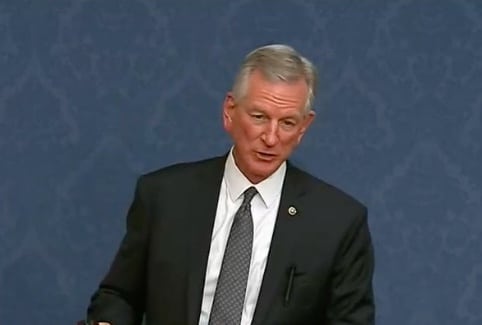Sen. Tommy Tuberville (R-AL) remained unwilling to budge Tuesday from his ongoing blockade of military promotions despite more Republicans voicing their disapproval of his actions.
Senate Minority Leader Mitch McConnell (R-KY) said Tuesday, “I think holding these non-policymaking career military [officials] who can’t be involved in politics at all is a mistake, and we continue to work on that and I hope at some point we can get it clear.”
While House Foreign Affairs Committee Chair Michael McCaul (R-TX) warned that Tuberville’s military blocks were “paralyzing the Department of Defense,” adding that the blocks have become a “national security problem and a national security issue. And I really wish he would reconsider this.”
But Tuberville is standing firm and says he will only release the holds if the government stops paying for service members to travel across state lines to obtain abortions. He shook his head “no” when asked Tuesday whether he was willing to negotiate a compromise with Defense Secretary Lloyd Austin—who has called Tuberville’s actions “unprecedented,” “unnecessary” and “unsafe”—or the White House.
One member of the Senate Armed Services Committee—in this case, Tuberville—is able to hold up potentially countless military promotions through a Senate procedure called “unanimous consent.”
More than 300 nominations have been held up so far this year, and that number could potentially reach 650 by the end of December. Further, because of Tuberville’s blocks, three branches of the military are currently working without a top commander.
On Tuesday, Tuberville also dismissed the idea of voting on the Senate floor for a bill sponsored by Republican Sens. Joni Ernst of Iowa and John Kennedy of Louisiana that would restrict Sec. Austin from being able to provide paid leave and transportation to service members seeking abortions. Rather, Tuberville wants the Pentagon to reverse the policy altogether, and then for Congress to vote on the issue.
He further argued that Austin didn’t have legal authority to change Defense policy with “a memo,” referring to an October 2022 memorandum to establish travel allowances for reproductive health care, following a Pentagon statement weeks earlier noting that U.S. laws restricts federal funds to “perform abortions” but not travel expenses.
In early August, Austin issued guidance to the military workforce on reshuffling key military roles in the wake of Tuberville’s holds. They include assigning certain lower-level officers to lead in an acting capacity.
However, Senate Armed Services Committee Chair Jack Reed (D-RI) said last week in a floor speech, “These positions cannot simply be filled by other officers—they can only be temporarily covered by their vice chiefs, who must also continue to cover their own jobs.”
Senate Majority Leader Chuck Schumer (D-NY) remains firmly against holding individual votes on any of the nominees, arguing that doing so would set a dangerous precedent.
“The bottom line is, this is a problem created by Republicans, and it’s up to them to solve it,” Schumer has told reporters. “We’re not going to shift the burden to Democrats.”
But other Senate Democrats have expressed disagreement with that position. For instance, Sen. Mark Kelly (D-AZ) on the Armed Service Committee has signaled he’s open to holding a vote on Biden’s nominee to replace outgoing Chairman of the Joint Chiefs of Staff Gen. Mark Milley: Air Force Chief of Staff Gen. C.Q. Brown.
“I want to do what’s in the best interest of our national security,” Kelly said. Noting that holding individual votes for the hundreds of blocked nominations is “not practical,” he added, “But for General Brown, you know, it certainly makes sense to get him confirmed.”


